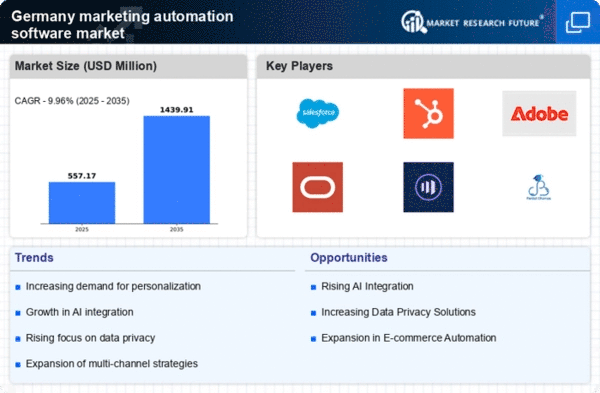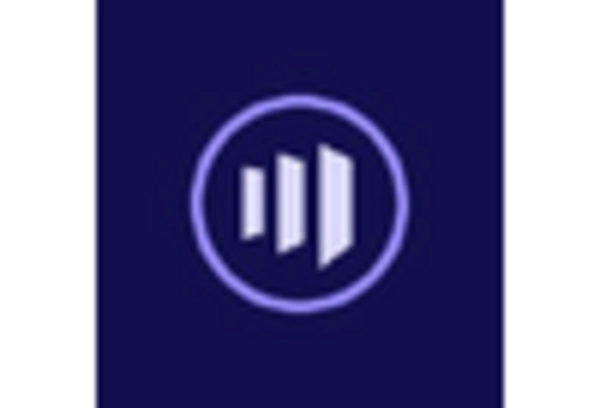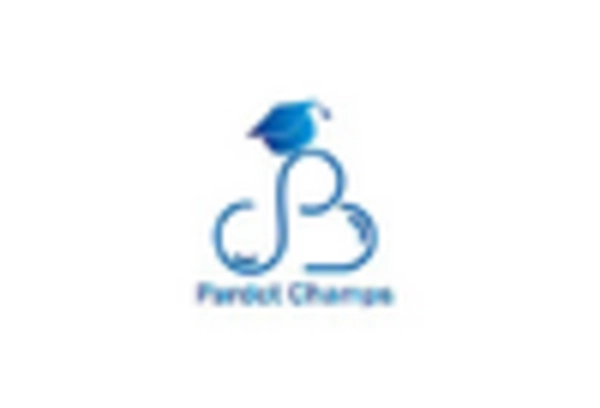Expansion of E-commerce Platforms
The marketing automation-software market in Germany is significantly influenced by the expansion of e-commerce platforms. As online shopping continues to gain traction, businesses are increasingly turning to marketing automation tools to manage their digital marketing efforts effectively. The rise of e-commerce has led to a heightened need for targeted marketing campaigns that can drive traffic and conversions. Recent statistics indicate that e-commerce sales in Germany are projected to reach €100 billion by 2025. This growth presents a substantial opportunity for marketing automation software providers to offer solutions that cater to the unique needs of e-commerce businesses, enabling them to engage customers and optimize their marketing strategies.
Integration of Advanced Analytics
The integration of advanced analytics into the marketing automation-software market is becoming increasingly prevalent in Germany. Businesses are recognizing the value of data-driven decision-making and are seeking tools that provide insights into customer behavior and campaign performance. Advanced analytics capabilities allow organizations to measure the effectiveness of their marketing efforts, identify trends, and make informed adjustments to their strategies. This trend is likely to enhance the competitive landscape of the marketing automation-software market, as companies that leverage analytics can achieve better targeting and improved ROI. The demand for analytics-driven solutions is expected to grow, as businesses strive to stay ahead in a rapidly evolving market.
Increased Demand for Personalization
The marketing automation-software market in Germany experiences a notable surge in demand for personalized marketing strategies. Businesses are increasingly recognizing the importance of tailoring their communications to individual customer preferences. This trend is driven by the need to enhance customer engagement and improve conversion rates. According to recent data, companies that implement personalized marketing strategies can see conversion rates increase by up to 10%. As a result, marketing automation tools that facilitate data collection and analysis are becoming essential for businesses aiming to deliver personalized experiences. This shift towards personalization is likely to continue shaping the marketing automation-software market, as organizations seek to leverage customer data to create targeted campaigns that resonate with their audience.
Growing Emphasis on Marketing Efficiency
In the context of the marketing automation-software market, there is a growing emphasis on improving marketing efficiency among German businesses. Organizations are increasingly seeking solutions that streamline their marketing processes, reduce operational costs, and enhance productivity. The ability to automate repetitive tasks allows marketing teams to focus on strategic initiatives rather than mundane activities. Data suggests that companies utilizing marketing automation can achieve a 14.5% increase in sales productivity. This drive for efficiency is likely to propel the adoption of marketing automation software, as businesses aim to optimize their marketing efforts and achieve better results with fewer resources.
Rising Importance of Customer Journey Mapping
In the marketing automation-software market, the rising importance of customer journey mapping is becoming evident among German businesses. Organizations are increasingly focusing on understanding the various touchpoints that customers encounter throughout their buying journey. By mapping these journeys, companies can identify opportunities for engagement and optimize their marketing strategies accordingly. This approach not only enhances customer experience but also improves conversion rates. Data indicates that businesses that actively engage in customer journey mapping can see a 20% increase in customer retention. As a result, marketing automation tools that facilitate journey mapping are likely to gain traction, helping businesses create more cohesive and effective marketing campaigns.
















